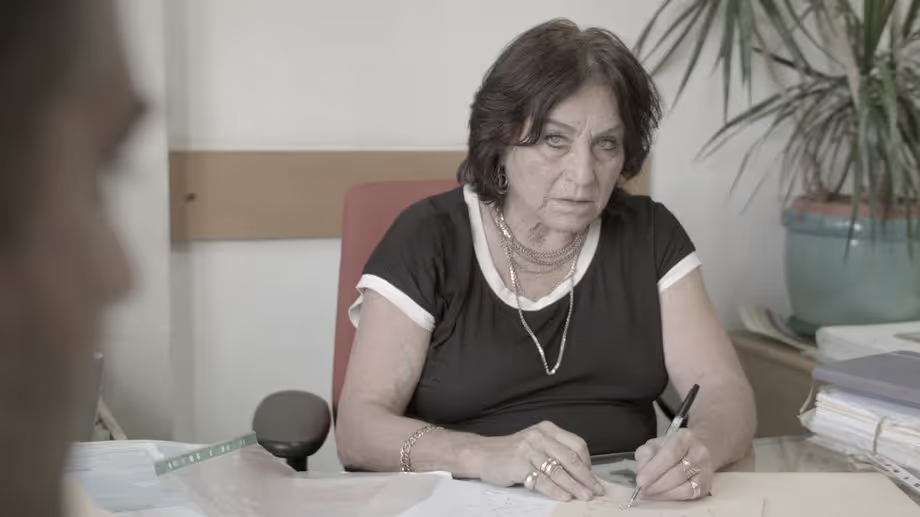Advocate: Perceptions of Justice
Overview

Against the backdrop of the Israeli-Palestinian conflict, directors Rachel Leah Jones and Philippe Bellaiche document the work of Lea Tsemel, a Jewish-Israeli human rights lawyer who has dedicated her life to representing Palestinian political prisoners in Israeli courts. Her defense of Palestinians who resist the occupation — through both violent and non-violent means — has earned her a reputation as “the devil’s advocate” from her opponents, but she believes in the potential of law as a tool to bring about justice. Of the work she says, “I can’t do anything else, I believe in it.”
In this lesson, students will grapple with the concept of “justice,” examining it through the lens of Lea Tsemel and her legal work, as well as from the perspectives of those who work by her side and against her. Students will delve into international law with regard to human rights and will assess Lea Tsemel’s strategy of using the legal system as a lever of social change. Relevant to World History, Global Studies, Civics, World Religions, and Law courses.
A Note from Curriculum Creators, Blueshift Education
Our work at Blueshift Education is to develop curriculum, resources, and relevant tools to deepen understanding on social justice issues in order to empower people, foster empathy, and bring about meaningful and lasting change. The documentary Advocate offers a compelling example and a unique opportunity to engage in this kind of transformational educational work. The film presents the story of one woman who has committed her life to the work of justice, upholding the law, and protecting the human rights of her clients in the face of entrenched and emotional opposition. In the summer of 2020 these critical issues are, quite literally, under a spotlight in the streets of cities across America and around the world. More than ever educators and students need tools to help navigate disagreement, negotiate for change, reach compromise, and respect the viewpoints of others, especially those with whom you disagree. We hope the essential questions, the select film clips, and the thoughtful exercises for Advocate offer an opening for educators and students to reflect on their own beliefs and work towards a more just world for all.
A Note to Teachers
This lesson is not a history lesson on the Israeli-Palestinian conflict, but it is impossible to divorce the documentary from the cultural, political, and historical context in which it occurs. With this negotiation in mind, it is important when using Advocate in a classroom to be familiar with the terminology if questions arise. We see using Advocate in the classroom within the context of units that cover post-World War II history, post-colonial studies, human rights issues and international human rights law.
The Key Terms and Concepts Document included with this lesson offers brief descriptions of terms and events referred to in the clips, and further teaching resources about the conflict are available in the resources section. As represented in Clip 1, the terms a person uses to refer to aspects of the conflict often reveal their political point of view. The definitions in the document are drawn from the non-partisan Middle East Research and Information Project, a non-governmental organization that reports on Middle East affairs. Because the documentary is spoken in Arabic and Hebrew with English subtitles, transcripts of the film clips are included in the lesson.
Keep in mind that Advocate and this lesson shine a light on violence and human rights injustices happening as a result of the Israeli occupation. Students who feel invested in the conflict may feel triggered by the content. Furthermore, the last 90 seconds of Clip 3, “A Big Problem in Human Terms” includes footage of an aggressive interrogation of a 13-year-old boy that may be upsetting to some students. Watch the clips ahead of time, consider your students and decide what content feels appropriate to bring into your class.
Advocate: Perceptions of Justice: Key Terms and Concepts
Subject Areas:
- World History/Global Studies
- Civics
- Constitutional Law
- Religious Studies
Grade Levels: [9-12]
Objectives:
In this lesson, students will:
- Consider the definition of “justice” in the context of the law and how individuals perceptions of justice are shaped
- Explore the context and moral framework that underpins Lea Tsemel’s legal work
- Articulate how the legal system might be used as a strategy of social change, and as a strategy to continue conflict
Materials:
- Film clips and equipment to project them
- Handout One, Transcripts for Clips 1, 2, and 3
- Handout Two, Transcripts for Clips 4 and 5
Time Needed:
Two 55-minute class periods with optional homework in between.

